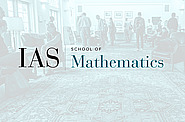2006-2007 seminars
Apr
17
2007
Apr
16
2007
Computer Science/Discrete Mathematics Seminar I
Fully Polynomial Time Approximation Schemes for Stochastic Dynamic Programs
11:15am|S-101
Apr
10
2007
Computer Science/Discrete Mathematics Seminar II
Aggregating Inconsistent Information: Ranking and Clustering
10:30am|S-101
Apr
09
2007
Computer Science/Discrete Mathematics Seminar I
The Complexity of Nash Equilibria
Christos Papadimitriou
11:15am|S-101
Apr
03
2007
Computer Science/Discrete Mathematics Seminar II
Pseudo-Random Number Generation by Algebraic Means (continued)
10:30am|S-101
Apr
02
2007
Mar
27
2007
Computer Science/Discrete Mathematics Seminar II
Pseudo-Random Number Generation by Algebraic Means
11:30am|West Building Lecture Theatre
Mar
26
2007
Computer Science/Discrete Mathematics Seminar I
Near-Optimal Algorithms for Maximum Constraint Satisfaction
Konstantin Makarychev
12:15pm|West Building Lecture Theatre
Mar
20
2007
Computer Science/Discrete Mathematics Seminar II
The Design and Analysis of Simple Algorithms: Part II
11:30am|S-101
Mar
19
2007
Computer Science/Discrete Mathematics Seminar I
A Cryptographic Study of Secure Internet Measurement
David Xiao
12:15pm|S-101
